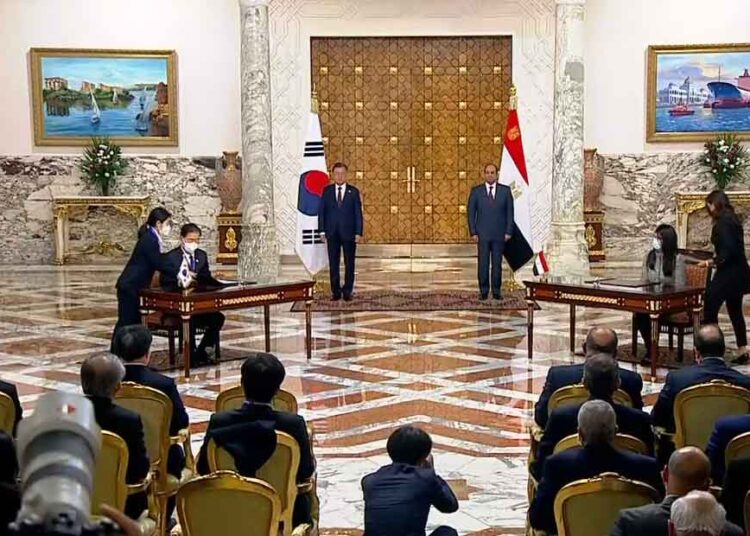Egyptian President Abdel Fattah El Sisi and South Korean President Moon Jae-in witnessed on Thursday in Al-Ittihadiya Palace the inking of a number of agreements, memorandums of understanding and documents.
Earlier, Sisi received the South Korean leader in an official reception ceremony where the national anthems of both countries were played.
The agreements included an MoU inked by the Minister of Trade and Industry Nevine Gamea and the South Korean minister of trade, industry and energy to conduct a joint study on trade and economic partnership between the two countries.
Also, an MoU was signed on financial co-operation with the Economic Development Co-operation Fund for 2022-2026 worth one billion dollars.
Minister of International Co-operation Rania al-Mashat and South Korean Foreign Minister Chung Eui-yong signed a document for preparations of a loan from the Economic Development Co-operation Fund (EDCF) for the project of upgrading Egypt-Luxor railways and the High Dam at cost of $251 million.
A document of exchanged letters on a non-refundable grant worth $7.9 billion was also signed by Minister Mashat and the foreign minister of South Korea.
Minister of Trade and Industry Nevine Gamea confirmed that the MoU signed between Egypt and South Korea comes within the framework of a series of intensive talks that took place during the last period between the two countries with the aim of enhancing joint economic, commercial and industrial co-operation during the next stage.
The minister said in press statements that the memorandum of understanding includes the formation of a joint working group headed by the Egyptian side that will be represented by the Agreements and Foreign Trade Sector in the ministry, and the South Korean side, represented by the department concerned with trade policies for the free trade zones.
The goals of the working group include conducting a joint study on the feasibility of concluding a trade and economic partnership agreement and determining the economic benefits of the agreement.
The working group will also work to developing policies and recommendations based on assessing the feasibility of the agreement. The minister added that the working group includes representatives from the relevant ministries, the private sector and academic bodies, noting that the final report submitted within 6 months of the start of the joint study.
The minister noted that the MoU includes conducting a joint study and making recommendations on policies in the economic structures of the two countries and recent trends in trade, investment and joint economic relations.
This will be in addition to studying the feasibility of concluding an economic partnership agreement aimed at eliminating or reducing trade obstacles facing trade in goods, besides other issues related to trade in goods, services and investment, as well as promoting industrial and investment development between the two countries and co-operation in the field of supply chains.
On the development of trade relations between Egypt and South Korea, the minister explained that the trade exchange rates between the two countries are currently witnessing distinct growth rates, reaching during the first 10 months of 2021 one billion and 890 million dollars, compared to about one billion and 286.6 million dollars during the same period in 2020, achieving an increase rate by 46.9 per cent.
Gamea stressed that Egypt and South Korea have historical bilateral relations that contributed to the launch of a distinguished system of joint economic cooperation in the fields of trade, industry and investment, praising South Korea’s choice of Egypt as its strategic partner in development projects in Africa and the Middle East.
The minister indicated the possibility of benefiting from the desire of the Korean side to enhance its exports to African countries through the localisation of some industries in Egypt and exporting to the African market within the framework of trade agreements concluded between Egypt and African countries besides benefiting from customs exemptions within the framework of those agreements.
In this regard, Gamea explained that Egypt, by virtue of its membership in a number of African preferential agreements, enjoys many customs and non-tariff advantages.
This would open prospects for co-operation and integration with 54 African countries, especially in light of Egypt’s current direction to create an adequate investment climate and adopt measures to facilitate trade.
The minister pointed out that there are distinguished investment opportunities for Korean business circles in Egypt in a large number of industrial sectors, benefiting from the network of free and preferential trade agreements signed with a large number of global economic blocs.
She indicated Egypt’s keenness to benefit from Korean expertise in using modern and advanced technology to transfer these experiences to African countries through tripartite co-operation between Egypt, South Korea and African countries.






Discussion about this post